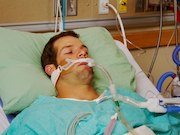No significant drop in mortality with extracorporeal membrane oxygenation in severe ARDS
FRIDAY, May 25, 2018 (HealthDay News) — For patients with very severe acute respiratory distress syndrome (ARDS), 60-day mortality is not significantly lower with venovenous extracorporeal membrane oxygenation (ECMO) than with continued conventional treatment, according to a study published online in the May 24 issue of the New England Journal of Medicine.
Alain Combes, M.D., Ph.D., from the Sorbonne Université in Paris, and colleagues randomized patients with very severe ARDS to receive immediate venovenous ECMO (124 patients) or continued conventional treatment (125 patients). Patients in the control group who had refractory hypoxemia could cross over to ECMO.
The researchers found that 35 and 46 percent of patients in the ECMO and control groups, respectively, had died at 60 days (relative risk, 0.76; 95 percent confidence interval, 0.55 to 1.04; P = 0.09). In 28 percent of the control group, crossover occurred at a mean of 6.5 ± 9.7 days after randomization; 57 percent of these patients died. There was no significant difference between the groups in the frequency of complications, except that there were more bleeding events leading to transfusion, more cases of severe thrombocytopenia, and fewer cases of ischemic stroke in the ECMO versus the control group.
“Among patients with very severe ARDS, 60-day mortality was not significantly lower with ECMO than with a strategy of conventional mechanical ventilation that included ECMO as rescue therapy,” the authors write.
Several authors disclosed financial ties to the pharmaceutical, medical device, and technology industries.
Abstract/Full Text (subscription or payment may be required)
Editorial (subscription or payment may be required)
Copyright © 2018 HealthDay. All rights reserved.








